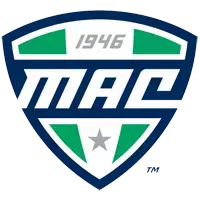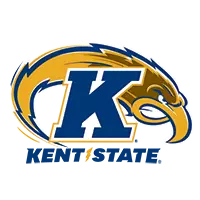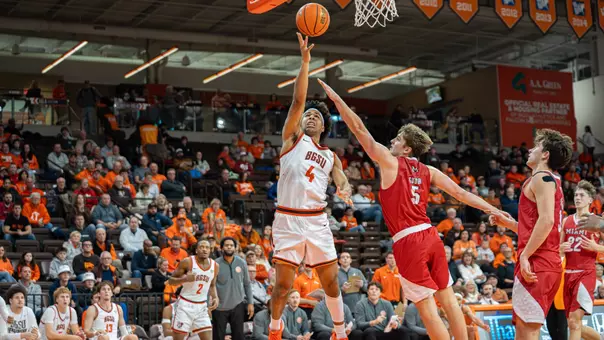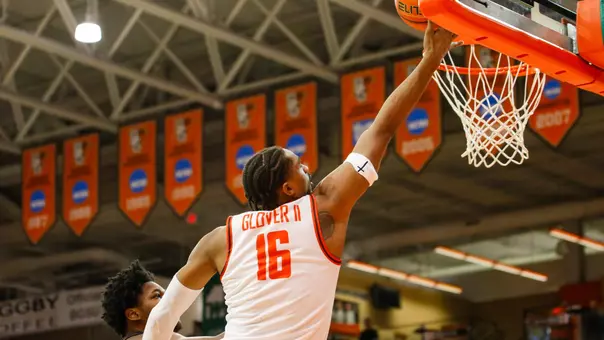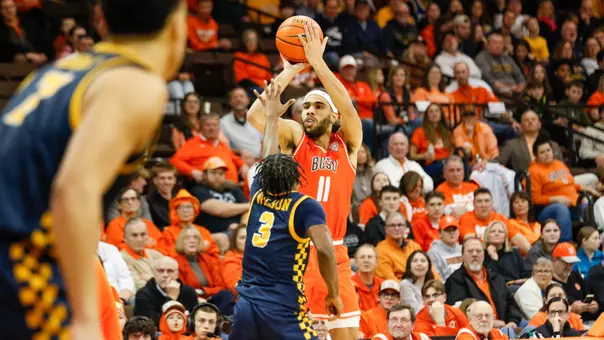Bowling Green State University Athletics
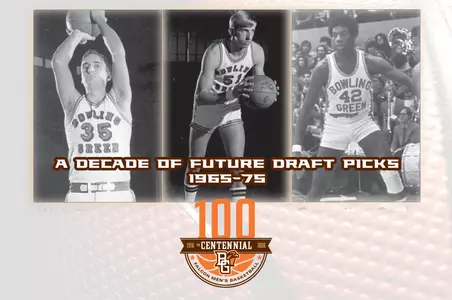
Centennial Season Look Back: – A Decade of Future Draft Picks- 1965-75
December 27, 2015 | Men's Basketball
News: The Centennial Season
Falcon Fans Photo Poster: Submit Your Photos Today!
Schedule: 2015-16 BGSU Men's Basketball Schedule
Tickets: Men's Basketball Season Tickets on Sale Now!
Bowling Green, Ohio – Throughout the 2015-16 Bowling Green State University men's basketball season, the BGSU athletics department will take a look back at each decade over the men's basketball program's history as part of the Centennial Season celebration leading up to the Centennial Game on Jan. 23, 2016 versus Kent State.
1967-68 MAC Champions
Bowling Green picked up its fourth MAC title in 1967-78, as the Falcons went 18-7 overall and 10-2 in conference play on the season. BGSU, who had non-conference wins over Virginia, Syracuse, St. Joseph's and DePaul, posted its first winning season since 1963-64.
The 1967-68 MAC Championship team was comprised up of Mark Hoffman, Carl Assenmeimer, Al Dixon, Walt Piatkowski, John Heft, Joe Henderson, Al Hairston, Richard Rudgers, Adrian Zuber, Wayne Kroll, Mark Hennessey, Sid Rodenheffer, John Compton, Dennis Cavanaugh, Jack Kagy (manager), James Barry (manager), head coach Bill Fitch, assistant coach Bob Conibear, assistant coach Jim Lessig and athletic trainer Bill Hanson.
Postseason Play – NCAA & NCIT
The Falcons made the postseason twice from 1965-75, including the NCAA National Championship Tournament in 1968. BGSU also competed in the National Commissioners Invitational Tournament (NCIT) in 1975.
In 1967-68, the MAC Champions made their fourth appearance in the NCAA Tournament and their first since 1963. The Falcons were edged by Marquette 72-71 in the first round of the national postseason tournament in Kent, Ohio.
In 1974-75, BGSU competed in the NCIT, which was a single-elimination tournament with eight NCAA Division I teams that did not participate in the 1975 NCAA Tournament or the 1975 National Invitation Tournament (NIT). In the NCIT event, the Falcons defeated Tennessee 67-58 in the first round before falling to the eventual champions in Drake 78-65 in the second round.
National Honors
Led by Walt Piatkowski's All-American honors in 1967-68, a handful of Falcons were recognized nationally from 1965-75.
Piatkowski was recognized as a Converse Honorable Mention All-American in 1967-68 in which he led the Falcons in scoring with 24.0 points per game. His scoring average of 24.0 points per contest that season still ranks fourth all-time in BGSU history, while his 601 points that year is the seventh most all-time for points by a Falcon in a single season. Named to the NABC All-District Third-Team in both 1966-67 and 1967-68, Piatkowski led the Falcons to the MAC Championship and NCAA Tournament in 1967-68.
Cornelius Cash earned a spot on the NABC All-District Second-Team in 1973-74 in which he led the Falcons in scoring with 13.9 points per game and in rebounding with a total of 322 rebounds. He also led the Falcons on the defensive end with what at the time was a program best 59 blocks. Cash would go on to be named one of 13 players to the All-Anderson Team.
Al Hairston and John Heft were BGSU's first-ever Academic All-Americans. Hairston was named to the Academic All-American Third-Team in 1968, while John Heft was named an honorable mention the following season in 1969.
1,000 Point Scorers
Walt Piatkowski finished his career in 1968 as the Falcons' fourth highest career scorer with 1,577 career points in his three years for BGSU. Piatkowski increased his scoring average each season for the Falcons, averaging 18.4 points in 1965-66, 22.3 points in 1966-77 and 24.0 points per game in 1967-68, BGSU's championship season. His 24.0 points per game in 1967-68 still ranks as the fourth highest season scoring average in BGSU history, while his career scoring average of 21.6 points per game still ranks third in BGSU's 100-year history. Piatkowski's 1,577 career points ranks seventh all-time in BGSU's career record books, while his 601 points in 1967-68 still ranks seventh all time for the most points by a Falcon in a single season.
Cornelius Cash totaled 1,245 career points in his three years as a Falcon from 1972-75. Cash's initial season as a Falcon was superb, as he totaled 469 points and averaged a career-high 18.0 points per game in 1972-73. He went on to average 13.9 points the following year in 1973-74 and finished his career with an average of 15.3 points per game in 1974-75. Cash, who ranks 24th all-time on BGSU's career scoring list with his 1,245 career points, was more known for his rebounding prowess, as he pulled down 1,068 career rebounds and is one of only two Falcons to have 1,000 career points and 1,000 career rebounds with the other being Nate Thurmond.
Jeff Montgomery, who played with Cash from 1972-75, finished his career with 1,238 points at BGSU. Montgomery, who totaled 555 points in 1974-75, averaged a career-best 19.8 points per game in 1974-75, and helped lead the Falcons to the NCIT. He also averaged 16.0 points per game in 1972-73 and 13.6 points per contest in 1973-74. Just behind fellow teammate Cash at 25th all-time on the BGSU career points list, Montgomery is ranked 11th in BGSU's record books with a career scoring average of 16.7 points per game.
Rich Walker, who played for the Falcons from 1968-1971, scored a total of 1,167 points over his three years at BGSU. Walker, who averaged 11.8 points per game his first season, led the Falcons in scoring in 1970-71 with a team-high 20.1 points per game that season. Walker scored a career-high 39 points versus Ball State on Dec. 13, 1969. His career scoring average of 16.2 points per game still ranks in a tie for 13th-place overall with both Anthony Stacey and John Reimold in BGSU's career record books, while he sits in 29th overall on BGSU's career scoring list.
Jim Connally eclipsed the 1,000 career points mark in his final season as a Falcon in 1970-71, scoring 1,036 career points from 1968-71. Playing alongside of Rich Walker all three seasons, Connally averaged 14.5 points in 1968-69, 10.7 points in 1969-70 and a career-high 17.2 points per contest in 1970-71. Tied for 40th all-time with Stanley Weber on the Falcons' career scoring list with 1,036 career points, Connally led the Falcons in rebounding in both 1969-70 and 1970-71, and ranks third all-time in BGSU history with a career rebounding average of 11.7 rebounds per contest.
All-MAC Accolades
Headlined by BGSU's first-ever MAC Player of the Year in Jim Penix in 1969-70, a number of Falcons received MAC honors throughout the 1965-75 era with Walt Piatkowski and Cornelius Cash each receiving all-conference recognition three times apiece.
Penix was named the MAC Player of the Year for the 1969-70 season. Penix, who also earned a spot on the All-MAC First-Team that season, led the Falcons in scoring with 19.5 points per game and a total of 448 points on the year. He was also named the BGSU Team MVP on the season and was later named to the All-Anderson Team.
Piatkowski was named to the All-MAC First-Team in both 1965-66 and 1967-68, and received second-team recognition in 1966-67. Named the Team MVP all three seasons from 1965-68, led the Falcons in scoring all three years as well with 18.4 points per game in 1965-66, 22.3 points per game in 1966-67 and 24.0 points per game in 1967-68. In the 1965-66 season, Piatkowski poured in a career-high44 points versus Marshall on Jan. 22, 1966, which still ranks as the eight highest point total for a Falcon in a single game in the program's 100-year history.
Like Piatkowski, Cash was also a three-time all-conference performer receiving First-Team All-MAC honors in 1972-73, 1973-74 and 1974-75. Cash led the Falcons in scoring in both 1972-73 (18.0 points per game) and 1973-74 (13.9 points per game), but also led BGSU in rebounding all three seasons he suited up for the Falcons. He pulled down 396 rebounds in 1972-73, 322 boards in 1973-74 and 350 rebounds in 1974-75. His 396 rebounds in 1972-73 still ranks third on BGSU's single season rebounding list, while he also ranks fifth with his 350 boards in 1974-75 and seventh with his 322 rebounds in 1973-74. He ranks second all-time in BGSU's career record books with 1,068 career rebounds and with a career rebounding average of 13.5 rebounds per game. He also ranks eight all-time in BGSU history with 93 career blocks.
Dan McLemore was a two-time All-MAC selection with second-team honors in 1968-69 and first-team honors the following season in 1969-70. In 1968-69, McLemore led the Falcons with 252 rebounds and was third on the team with 326 points, an average of 13.6 points and 10.5 rebounds per game on the year. The following season in 1969-70, he was second on the team with 17.4 points per game and 10.3 rebounds per contest. McLemore posted a career rebounding average of 10.4 rebounds per game over his two years at BGSU, which ranks fifth all-time in BGSU history.
Al Hairston was named to the All-MAC Second-Team in 1967-68 in which he was second on the team behind All-American Piatkowski with an average of 14.5 points per game in the Falcons' championship season.
Both Rich Walker and Jim Connally were named to the All-MAC Second-Team in 1970-71. Walker, who was named the BGSU Team MVP that season as well, led BGSU in scoring with 503 points and an average of 20.1 points per game. Connally, who averaged 17.2 points per game that season, led BGSU in rebounding that year with 346 boards, an average of 13.8 per contest. His 346 rebounds in 1970-71 still ranks sixth all-time on BGSU's single season rebounding list. Connally ranks third all-time in BGSU history with a career rebounding average of 11.7 boards per contest and fifth with 851 career rebounds.
Brian Scanlan received second-team honors in 1972-73 in which he averaged 12.0 points and 6.2 rebounds per game. He shot a team-high 50.4 percent from the field overall in 24 games on the year. In 1971-72, Scanlan led the Falcons in both scoring at 13.9 points per game and in rebounding with 7.2 rebounds per game to be named the BGSU Team MVP.
Jeff Montgomery was named to the All-MAC Second-Team in 1974-75, while both Skip Howard and Steve Cooper received honorable mention honors that same season.
Named the BGSU Team MVP in 1974-75, Montgomery led the Falcons in scoring with 19.8 points per game and also totaled a team-high 135 assists on the season.
Howard averaged 10.2 points and 7.6 rebounds in 1974-75, the season after he was named the BGSU Team MVP in 1973-74. Howard, who also had 49 blocks in 1972-73, had a total of 693 career rebounds in his three years as a Falcon from 1973-75. He ranks eighth all-time with a career rebounding average of 8.8 rebounds per game and also ranks ninth in BGSU's history with his career 693 boards.
Cooper averaged 9.6 points per game and totaled 86 assists overall in 1974-75 to earn honorable mention recognition. It was his lone season for the Falcons.
Ed Behm (1967), Hairston (1967 & 1968), Dennis Cavanaugh (1968 & 1970), Al Russ (1972), Dalynn Badenhop (1972) and Jack Wissman (1973 & 1974) all earned Academic All-MAC honors, with Hairston, Cavanaugh and Wissman all receiving the conference academic recognition twice during their time at BGSU.
Other Notable Falcons
Richard "Dick" Rudgers was named the BGSU Team MVP in 1968-69 in which he led the Falcons in scoring with 368 total points and an average of 16.1 points per game.
Al Dixon led the Falcons in rebounding in 1965-66, 1966-67 and in 1967-68. He pulled down 264 rebounds in 1965-66, 237 boards in 1966-67 and a career-high 273 rebounds in 1967-68. His 273 rebounds in 1967-68 ranks as the ninth most rebounds by a Falcon in a single season in the program's history. Dixon's career rebounding average of 11.1 rebounds per game ranks fourth all-time in BGSU history, while his 774 career rebounds ranks seventh all-time on the Falcons' career rebounding list. His 31 rebounds versus Northern Illinois on Jan. 20, 1966, is tied for the BGSU record for the most rebounds in a game by a single player with Nate Thurmond.
Sam Mims pulled down a total of 372 rebounds in his two seasons from 1964-66, an average of 9.1 rebounds per contest which still ranks seventh all-time in BGSU's career record books.
Falcons Coaching Carousel
After head coach Harold Anderson's 21 year run as the leader of the BGSU men's basketball program ended with his retirement in 1962-63, the 1965-75 decade of Falcons' basketball saw four different coaches in Warren Scholler, Bill Fitch, Bob Conibear and Pat Haley.
Scholler, who took over for Anderson prior to the 1963-64 season went 43-52 overall from in four seasons at BGSU. His Falcon teams went 9-15 in 1965-66 and 11-13 in 1966-67.
Fitch took over the program in 1967-68, leading the Falcons to an 18-7 overall record and a 10-2 MAC record. BGSU would go 10-0 at home in Anderson Arena on its way to its fourth MAC Championship and fourth NCAA Tournament appearance. However, Fitch would leave after just one year in Bowling Green to move on to be the head coach at the University of Minnesota from 1968-70, before jumping to the NBA where he was twice named the NBA Coach of the Year (1976 and 1980).
Conibear, an assistant coach for Fitch during the 1967-68 MAC Championship season, took over the reins in 1968-69 and posted an overall record of 31-42 in three seasons as the head coach of the Falcons from 1968-71. BGSU posted records of 9-15 in 1968-69, 15-9 in 1969-70 and 7-18 in 1970-71 under Conibear.
Haley took as head coach in 1971-72 and closed out the sixth decade of BGSU men's basketball, serving as the leader of the Falcons until the 1975-76 season. Haley recorded an overall record of 62-69 during his five years at BGSU, which included three .500 seasons and a program high 18 wins since Coach Anderson's final year in 1962-63. His first team went 4-20 overall and 1971-72, yet bounced back to go 13-13 overall a year later in 1972-73. Haley's teams improved to 15-11 in 1973-74 and then went 18-10 in 1974-75 to earn a spot in the NCIT postseason tournament.
Falcons that moved on to the Pros
BGSU had a total of 13 different Falcons move on to the professional ranks in either the NBA or ABA from 1965-75, including 10 players and three coaches.
Bill Fitch, who was the head coach for the 1967-68 MAC Championship Team at BGSU, moved on to have a very successful career in the NBA as a head coach. During his 25-year pro coaching career Fitch repeatedly was hired in an attempt to improve failing teams.
He was awarded the NBA's Coach of the Year Award twice and he guided Larry Bird, Kevin McHale, Robert Parish and the rest of the Boston Celtics to the 1981 NBA championship, defeating the Houston Rockets 4 games to 2 in the finals. From Boston, Fitch went on to coach the Rockets where he led a team featuring Hakeem Olajuwon and Ralph Sampson to the 1986 NBA Finals where they were defeated by the Celtics, 4 games to 2, for the NBA Championship. Fitch also coached the Cleveland Cavaliers from its inception in 1970 to 1979, as well as New Jersey Nets and Los Angeles Clippers. In 1996 Fitch was named one of the NBA's Ten Greatest Coaches of All-Time.
Jim Lessig followed Fitch and joined the NBA expansion franchise Cleveland Cavaliers as an assistant coach, head scout and director of special promotions in 1970-71. He also served as an analyst for Cavalier basketball games and Cleveland Indians baseball games.
Bob Hill, who played for the Falcons from 1969-71, he coached in the NBA from 1985-2007 after coaching as an assistant at Kansas University from 1979-85. Hill was an assistant coach for the New York Knicks in 1986-87, before moving on to be an assistant for the Indiana Pacers under Dick Versace from 1987-90. He was promoted to head coach of the Pacers in 1990 and spent three season as the head coach from 1990-93, in which he led the Pacers to the NBA playoffs.
Hill then went on to be the head coach of the San Antonio Spurs from 1994-1997, leading them to an NBA-best 62 wins in the 1994-95 season before losing to the Houston Rockets in the Western Conference finals.
After coaching at Fordham University from 1999-2003, Hill returned to the NBA to coach the Seattle SuperSonics on Jan. 3, 2006. He coached the Sonics for the remainder of the 2005-06 season and for the 2006-07 season.
Al Hairston, Walt Piatkowski and Al Dixon were all drafted in the 1968 NBA Draft.
Hairston was selected 52nd overall by the Seattle Supersonics in the fifth round of the 1968 NBA Draft and by the Kentucky Colonels in the 1968 ABA Draft. He played two seasons for the SuperSonics from 1968-70, averaging 2.2 points per game.
Piatkowski was picked 99th overall in the eighth round of the 1968 NBA Draft by the San Francisco Warriors. However, the 6-8 forward played in the ABA from 1968-70 with the Denver Rockets who drafted him in the 1968 ABA Draft, earning ABA All-Rookie Team honors in 1969 after averaging 12.2 points per game. After a brief retirement in 1970, Piatkowski returned to the ABA as a member of
The Floridians in 1971-72.
Dixon was a third round selecting by the Kentucky Colonels in the 1968 ABA Draft and was selected in the 11th round by the Baltimore Bullets in the NBA Draft that same year. However, rather than playing for either the Colonels or the Bullets, he chose to play with the Globetrotters for a little over a year in 1968-69.
Jim Connally was picked in the 11th round overall by the Seattle SuperSonics in the 1969 NBA Draft, while Jim Penix and Dan McLemore were both selected by the Portland Trail Blazers in the 1970 NBA Draft. Penix, who was picked in the fourth round by the Trail Blazers was also selected by the Denver Rockets in the 1970 ABA Draft, while McLemore was drafted in the 11th round.
Rich Walker was drafted by the Cleveland Cavaliers in the ninth round of the 1971 NBA Draft by former Falcons' head coach Bill Fitch. He was also selected by the Indiana Pacers in the 1971 ABA Draft.
Mark Cartwright was picked in the 10th round of the 1974 ABA Draft by the Virginia Squires.
Cornelius Cash was selected 24th overall by the Milwaukee Bucks in the second round of the 1975 NBA Draft and by the San Diego Sails in the second round of the 1975 ABA Draft. He was waived by the Bucks in November of that year, but was signed by the Detroit Pistons prior to the 1976-77 season and saw action in six games that season. In addition to his time in the NBA, Cash also played professional basketball in Belgium, Yugoslavia and Brazil.
Skip Howard was picked in the ninth round of the 1975 NBA Draft by the Cleveland Cavaliers.
Cliff Williams, who averaged 23.1 points per game for the BGSU freshman team in 1963-64 and scored 82 points in 13 games for the Falcons in 1965-66, played as an undrafted free agent in three games for the Detroit Pistons in 1968, totaling four points.
Hall of Famers from the Era
BGSU had four future BGSU Athletics Hall of Famers at BGSU during 1965-75 in Walt Piatkowski, Rich Walker, Cornelius Cash and most recently Jim Lessig.
Piatkowski was an All-Ohio basketball star at Toledo Woodward High School, earning three letters on the court at BGSU. He lettered twice under coach Warren Scholler, before a berth in the NCAA Tournament his senior season in 1967-67. He is one of only three Falcons to be named a three-time BGSU men's basketball MVP. His 1,577 points ranks seventh on BG's all-time scoring list, while his 21.6 career scoring average ranks third to this date. Piatkowski also grabbed 628 rebounds at BGSU.
Piatkowski led the MAC in scoring as a sophomore (442 points, 18.4 ppg) and junior (534, 22.3), and finished second in MAC scoring as a senior (601, 24.0). He earned honorable mention All-American honors from Converse his senior season in 1968 and was a two-time first-team All-MAC pick in 1966 and 1968. He was also a second-team selection in 1967.
A second round draft pick of the Denver Nuggets in the ABA, Piatkowski's pro career spanned three seasons, two with the Nuggets and one with the Miami Floridians. He was named to the ABA's All-Rookie team after scoring 942 points with the Nuggets in 1968-69.
Piatkowski was inducted into the BGSU Athletics Hall of Fame in 1989.
Walker has long been recognized as one of the top all-around basketball players in Falcon history. A three year starter beginning with the 1968-69 season, Walker concluded his career with 1,167 points, which at the time was ninth on the BG scoring list at the time.
The Inkster, Mich. native was 10th in the league in scoring (16.5 ppg) as a junior before earning second team All-MAC honors as a senior, leading the team with a 20.1 scoring average to rank fourth in the league.
He began his coaching career at BGSU serving as a graduate assistant coach in 1972-73. He then served as an assistant coach at Western Michigan before becoming the head coach at both Elmhurst College and Florida International. In the spring of 1990 he joined Tom Davis' staff at Iowa, helping the Hawkeyes to three straight NCAA Tournament berths.
Walker was inducted to the BGSU Athletic Hall of Fame in 1994.
Cash, a native of Dayton, Ohio, was a three-year letterwinner and a prolific rebounder for Falcon coach Pat Haley's teams. An All-Mid-American Conference First-Team selection in each of those three years, Cash averaged 15.8 points and a whopping 13.5 rebounds for his career. In 79 games, he had a total of 1,245 points and 1,068 boards.
Cash, a member of the last freshman team in BGSU history, averaged 17.5 points and 14.2 boards per game with that freshman squad, leading them to a 10-4 record and showing signs of things to come. As a sophomore in 1972-73, Cash was the top-rebounding forward in the nation with an average of 15.2 rebounds per game. He finished eighth in the nation overall, and also averaged 18.0 points per outing en route to being named BGSU's Most Valuable Player.
In his junior year, Cash led the Falcons in both scoring and rebounding for the second-straight year. He had 13.6 points per game, pulled down 12.4 boards per game to rank fourth in the conference, and had a total of 59 blocked shots, which was the BGSU single-season school record until the 2012-13 season.
Then, in his senior season of 1974-75, Cash averaged 15.3 points and a MAC-high 13.0 rebounds per game pulling down 22 boards twice that year. In one of BGSU's 18 wins that year, Cash had a 22-point, 22-rebound performance in a win over San Diego State. The Falcons went 18-10 that year, including a 9-5 MAC mark, and finished third in the NCIT, beating Tennessee before losing to Drake.
In February of 1975, Cash became only the third MAC player to reach the 1,000 plateau in both points and rebounds. He joined fellow Falcon Hall-of-Famer Nate Thurmond and Miami's Wayne Embry on that list.
Cash led the MAC in rebounding as a senior, finishing 15th in the nation. He hit double figures in either points or rebounds in 25 of 27 games as a senior and 70 of 79 games in his career. Cash was a second-round choice by the Milwaukee Bucks in the 1975 NBA draft. He was waived by the Bucks in November of that year, but was signed by the Detroit Pistons prior to the 1976-77 season and saw action in six games that season. In addition to his time in the NBA, Cash also played professional basketball in Belgium, Yugoslavia and Brazil.
Cash finished his BGSU career ranked second in school history in career rebounding and ninth in scoring. He remains second on the rebounding chart, trailing only Thurmond, and is now 24th on the BGSU scoring list. He was inducted into the BGSU Athletics Hall of Fame in 2009.
Just this past fall, BGSU inducted Lessig into the BGSU Athletics Hall of Fame.
A native of Canton, Ohio, Lessig served at BGSU in a variety of capacities, including as the department's Athletics Director from 1978-82. During the 1960s and 70s, he was an assistant basketball coach, assistant athletics director, director of alumni affairs and executive director of alumni and development at the University. He went on to serve as MAC Commissioner from 1982-90 and was inducted into the MAC Hall of Fame in 2014.
In 1969, Lessig left Bowling Green to become assistant basketball coach to Bill Fitch at the University of Minnesota, but one year later he was on the ground floor of the NBA expansion franchise Cleveland Cavaliers as assistant coach, head scout and director of special promotions. He also served as analyst for Cavalier basketball games and Cleveland Indians baseball games.
Lessig rejoined the Bowling Green staff in 1971 and was named Athletics Director in 1978. He continued his successful career at the University until he was named athletics director at Kansas in May of 1982. However, later in the year, he was summoned back to lead the MAC as Commissioner.
His leadership in the MAC was a benefit to Bowling Green as he made a significant impact in the early implementation of women's athletics within the conference, provided leadership in facility expansion and improvements and opened the league's television exposure with the advent of regional television expansion.
During his tenure as Athletics Director at Bowling Green, Lessig oversaw two NCAA tournament appearances for the hockey program, a 1981 men's basketball co-MAC championship and three consecutive women's cross country MAC titles.
Year-by-Year Breakdown
| YEAR | RECORD | HEAD COACH | CAPTAIN | LEADING SCORER |
| 1965-66 | 9-15 (6-6 MAC) | Warren Scholler | Robert Van Poppel & Nick Aloi | Walt Piatkowski – 18.4 ppg |
| 1966-67 | 11-13 (5-7 MAC) | Warren Scholler | Rich Hendrix | Walt Piatkowski – 22.3 ppg |
| 1967-68 | 18-7 (10-2 MAC) | Bill Fitch | Al Hairston | Walt Piatkowski – 24.0 ppg |
| 1968-69 | 9-15 (3-9 MAC) | Bob Conibear | Richard Rudgers | Richard Rudgers – 16.1 ppg |
| 1969-70 | 15-9 (7-3 MAC) | Bob Conibear | Jim Penix | Jim Penix – 19.5 ppg |
| 1970-71 | 7-18 (2-8 MAC) | Bob Conibear | Rich Walker & Robert Quayle | Rich Walker – 20.1 ppg |
| 1971-72 | 4-20 (1-9 MAC) | Pat Haley | Jeff Booms & Thomas Babik | Brian Scanlan – 13.9 ppg |
| 1972-73 | 13-13 (7-5 MAC) | Pat Haley | Thomas Babik & Le Henson | Cornelius Cash – 18.0 ppg |
| 1973-74 | 15-11 (7-5 MAC) | Pat Haley | Brian Scanlan & Skip Howard | Cornelius Cash – 13.9 ppg |
| 1974-75 | 18-10 (9-5 MAC) | Pat Haley | Cornelius Cash & Skip Howard | Jeff Montgomery – 19.8 ppg |
BG MBB : Postgame Interviews 2.17
Wednesday, February 18
BG MBB : Toledo Orange Wave Recap 2.14
Monday, February 16
BG MBB : Postgame Interviews 2.14
Sunday, February 15
BG MBB : Postgame Interviews 2.3
Wednesday, February 04

.png&type=webp)


